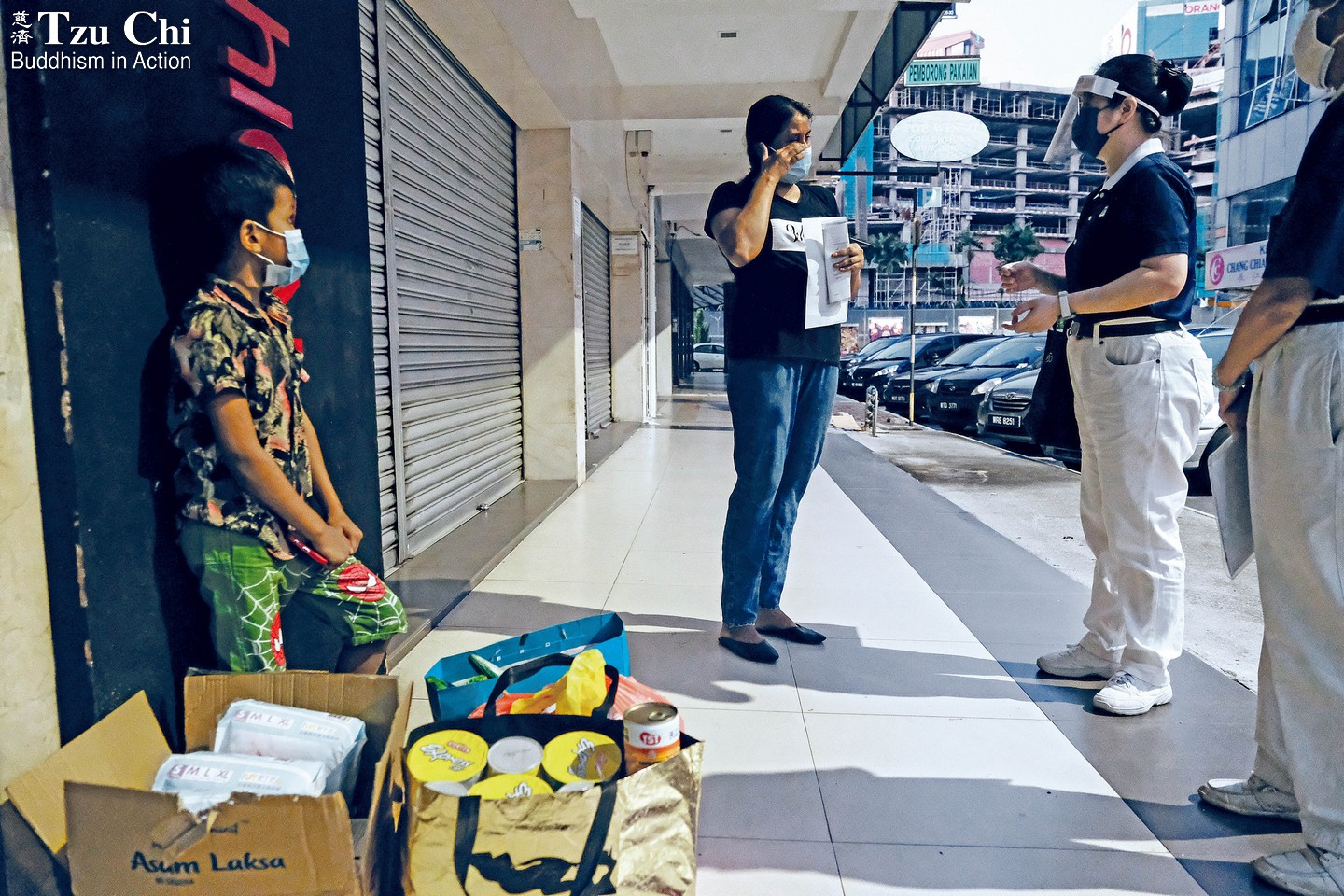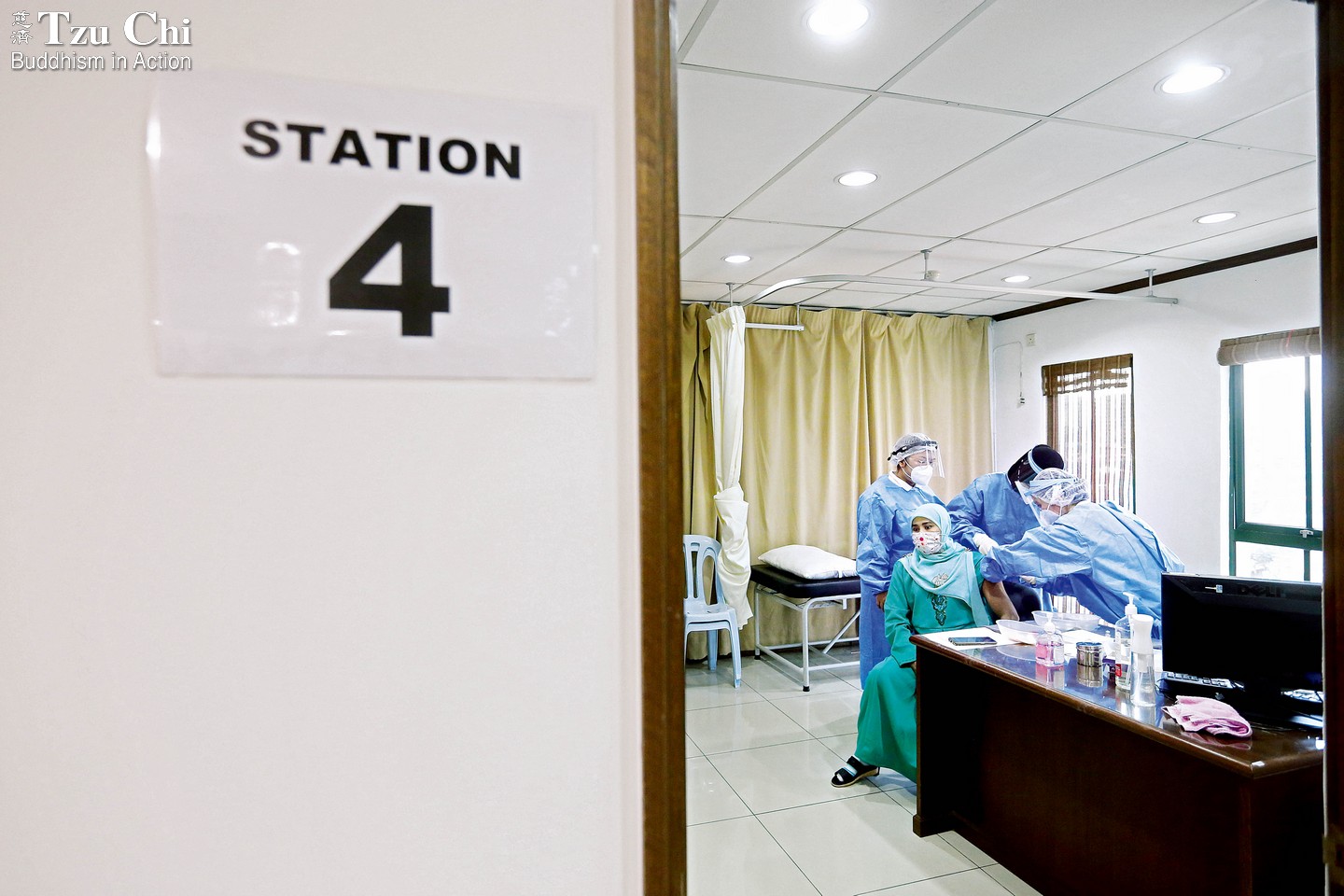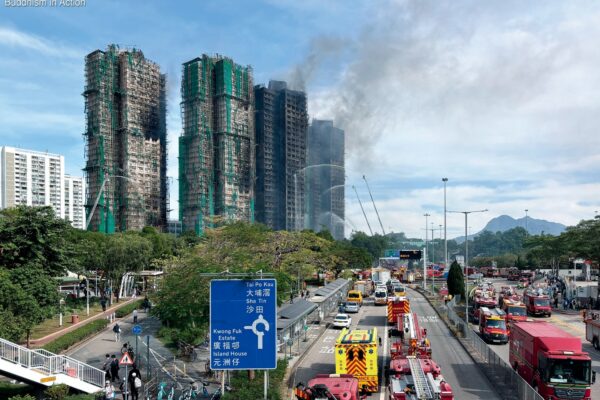Information provided by Tzu Chi Kuala Lumpur and Selangor
Translated by Wu Hsiao-ting
A little girl was so happy to receive a bag of rice from Tzu Chi she used it as a pillow, falling soundly asleep.
The pandemic in Malaysia became very severe in July 2021. It peaked in August with nearly 25,000 new cases recorded in a single day. The Movement Control Order was lifted and reinstated repeatedly, impacting businesses and industries across the board. Low-income families were hit especially hard and had difficulties putting food on their table. A social movement called the White Flag emerged in the midst of these dire circumstances to enable struggling Malaysians to ask for help. Food banks were also set up to aid the needy. The Tzu Chi Kuala Lumpur and Selangor branch responded by launching a food care project for communities. From July to September, enough food to help 45,000 families was given out at more than 40 locations.
One of the mothers helped by Tzu Chi had been using flour to make various foods for her family, her rice supply long since depleted. At first her children dreamed of having rice to eat, but that dream nearly faded away as the pandemic dragged on and the family struggled to make ends meet. So, when the family received some food from Tzu Chi, among which was a five-kilogram (11-pound) bag of rice, they were overjoyed. When a volunteer phoned the family afterwards to check on them, the mother said happily, “My youngest daughter was so happy with the bag of rice, she used it as a pillow and fell soundly asleep.”
On September 10, volunteer Yap Poh Wee (葉寶蔚) received a message on her cell phone from a Burmese refugee, Samira: “Do you know of any place where I can apply for free food? We have only half a can of powdered milk left at home. My husband and I are waiting to get our second COVID shots, so we can’t go look for a job yet.” Upon receiving the message, Yap applied for Samira to a Tzu Chi food care project for refugees. As soon as she received the gift vouchers intended for Samira, she rushed to her home to deliver them.
Yap had also helped Samira obtain financial aid from Tzu Chi a couple of months earlier, in July. Since the pandemic was bad at the time, Yap knew that it would be a hassle to get food at a store, so when she and other volunteers delivered the financial aid to Samira, they also brought her food and other essentials donated from their own homes. They donated baby diapers, face masks, canned food, vegetables, instant noodles, and eggs. Samira burst into tears when she saw the gifts prepared by the volunteers.
Samira left Myanmar for Malaysia 13 years ago. She met her future husband in Malaysia and started a family with him. The couple never asked for help from others until the pandemic, which hit them hard. They couldn’t pay their rent and their children were starving. At their wits’ ends, they sought help from the United Nations High Commissioner for Refugees (UNHCR). “An official there called me back and told me there was a charity organization that could help me,” Samira recalled. She contacted the charity organization and was surprised by how quickly the volunteers arrived at her home. She was even more surprised when she learned that the organization was the very one and the same that had provided her free medical treatment at a free clinic in Kuala Lumpur.

Samira (middle) burst into tears when she saw the food delivered by Tzu Chi volunteers. Lin Zhen Sheng
There are more than 170,000 refugees and asylum seekers registered with the UNHCR in Malaysia. With no legal identity, they were hard pressed to get by, even before the coronavirus outbreak. The pandemic just added insult to their financial injury—their income was cut off when the Movement Control Order was enacted and they couldn’t go out to work.
Seeing the need, Tzu Chi and the UNHCR co-launched a program in April 2020 to help refugees cope with the crisis. The UN agency provided the relief funds and lists of potential refugees for help, and Tzu Chi volunteers assessed the refugees’ conditions and delivered cash to their homes if their aid was approved. Aid was given out every three months under the program, for a maximum of nine months.
Volunteers learned about the plight of many refugees as a result of the program. Some had been evicted from their rentals because they couldn’t afford their rent, and quite a few others were running out of food supplies at home. In August 2021, Tzu Chi Kuala Lumpur and Selangor started another care program for refugees, offering gift vouchers to be used at designated stores. Upon receiving their gift vouchers, a mother and son purchased two bags of rice along with other food. With tears coursing down their cheeks, they said, “We’ve been getting by on just one meal every other day for the last two months. Never once have we felt full during all that time. But that will change tonight. We’ll fry up some eggs to go with rice. We’ll finally be able to eat our fill.”
The Buddhist Tzu Chi Free Clinic in Kuala Lumpur has remained open during the pandemic. Dr. Foo Seay Liang (符之良), the director of the free clinic, said: “It’s not easy for refugees to get healthcare. If we closed, what would they do?” The free clinic not only continues to provide treatment for refugees during the pandemic—they also arrange for chronic condition medications to be delivered to refugees’ homes. They also offer free COVID screening and vaccinations to make it easier for refugees to return to work and sustain their livelihoods.

The Buddhist Tzu Chi Free Clinic in Kuala Lumpur offers COVID-19 shots to refugees. Zhuang Gui He



